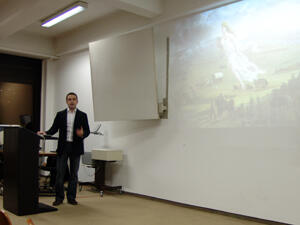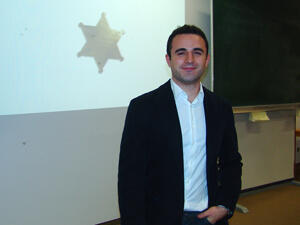American Corner Innsbruck
Lecture by Mag. Andreas Leisner
LAW'S LABOR'S LOST? THE AMBIGUOUS IMAGE OF MARSHALS AND SHERIFFS IN AMERICAN HISTORY AND POPULAR CULTURE
Nov. 26, 2008, 6 p.m., room 50109 (Zwischentrakt, 1st floor)



“Law’s Labor’s Lost?” was the question Mag. Andreas Leisner raised in his talk on November 26, 2008, an event in the ACI’s Public Lecture Series. Students, faculty, and friends of the ACI followed the invitation and joined in for an inspiring evening dedicated to the field of Law and the Humanities. The ambiguity of the sheriff figure in history and its depiction in popular culture was at the center of Mr. Leisner’s presentation, in which he shed light on the role(s) of the lawman both in reality and in fiction.
Andreas Leisner began his talk with an illustration of Frederick Jackson Turner’s frontier-thesis, capturing the tangible and the abstract borders of the emerging American Mind. Since the frontier was both meeting point and zone of great conflict, legislation in the U.S. West was based on moral consensus and was known for harsh punishments, mirroring the harsh living conditions and prevalent violence at the frontier. A brief historical outline and linguistic caption of the emergence and original work of sheriffs and marshals explained their function as someone with judicial and fiscal powers, as tax collectors, jailers and even executioners. In the U.S., as of 1776, the position of the sheriff was established as an elected office after the colonies’ achieved independence.
In popular culture, Andreas Leisner further explained, the sheriff is often portrayed as a Janus-faced, ambiguous, and sometimes corrupt figure. Most commonly, sheriffs are only minor characters in traditional Westerns, where they are often criticized and fought by the stories’ heroes.
In a socio-political reading of Fred Zinnemann’s 1952 film High Noon, where the main figure is actually a marshal, Andreas Leisner offered insights into the film’s hidden and more explicit criticism of McCarthyism and conformism.
About the perpetuation of the myth of the sheriff in popular culture, Andreas Leisner concludes that Westerns usually convey an ambiguous image of Wild West icons; that the Western has been used as a propagandistic vehicle; that Westerns often contain the meta-narrative of leadership-ideals; that even critical versions of Westerns, like High Noon, display the same pattern of exceptionalism; and finally, that in Westerns there is a constant danger of developing an ideology based on romanticized fiction rather than fact. After all, Westerns offer a distorted image of the “western peace officer” and the question whether law’s labor’s lost or won is essentially one of cultural construction, connotation, and interpretation.
The well-attended lecture was followed by a reception, where people discussed the challenging questions raised by Andreas Leisner more informally over a glass of wine.
(text: Claudia Schwarz)


Abstract
Following an introduction to Turner’s frontier-thesis as well as to legal conditions in the American west of the 19th century, I will focus on United States lawmen (i.e. the sheriff or marshal, respectively), historical representatives of this office, and their cinematographic incarnations with special consideration of Fred Zinnemann’s classic High Noon (1952). The aim of the presentation is to shed light on the highly distorted image of the western peace officer in both history and popular culture.
Andreas Leisner
Andreas Leisner is a Ph.D. student at the Department of American Studies at the University of Innsbruck. The title of the dissertation he is currently working on is “American Prometheus: U.S. Individualism in National Mythology and on the International Level.”


